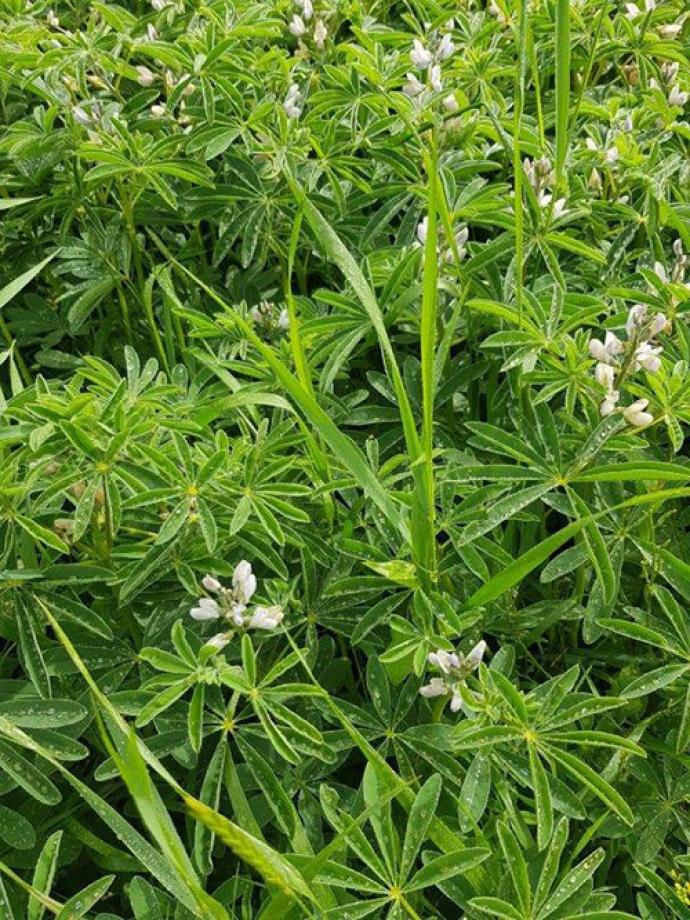
The PROVEG (PROtéines VEGétales) research project aims to evaluate and spatialize the potential of a diversity of crops that are absent or not well established in the Normandy region, and whose productions have a higher protein content than that of currently cultivated plants.
This approach is in line with the desire to contribute to the development of protein crops in order to increase their production, but also responds to the need to diversify and extend rotations. Thus, the project will evaluate the potential of a diversity of leguminous seed crops (pea, faba bean, lupin, lentil), but also that of a currently minor crop: quinoa.

PROVEG (PROtéines VEGétales) is a 2-year project, selected within the framework of the AMI Protéines Végétales Normandie 2019, which is based on the Regional Plan for plant proteins for human consumption. This research project is financed by the Normandy Region and by the European Funds FEDER.
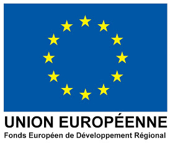
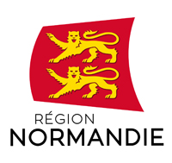
The context
Due to their protein content, several types of plants have advantages for human nutrition, including legumes, cereals and oilseeds. The role of legumes in nutrition has been recognized as a relevant source of protein as well as for other health benefits. Soybean, peanut, bean, pea, lupin, chickpea, faba bean, faba bean or lentil are currently the most important legumes for human nutrition (DeRon, 2015).
Increasing the share of legumes in cultivated areas could reduce the current protein deficit and contribute to the transition to more sustainable agricultural systems. Indeed, legumes contribute to sustainable environmental improvement due to their ability to fix nitrogen and their beneficial effects on the soil (Coba de la Pea and Pueyo, 2012; Drevon et al. 2015; Mahmood et al. 2017).
Some minor crops, such as hemp, amaranth, quinoa, buckwheat, and chia, are known to be excellent sources of protein, and their seeds in particular contain the essential amino acid lysine, which is not commonly found in cereals. Nutritional evaluations of quinoa, for example, indicate that it is a source of complete protein, minerals, vitamins, high quality oils and flavonoids. This crop maintains significant productivity in poor soils and under conditions of water stress and high salinity (Choukr-Allah et al. 2016).
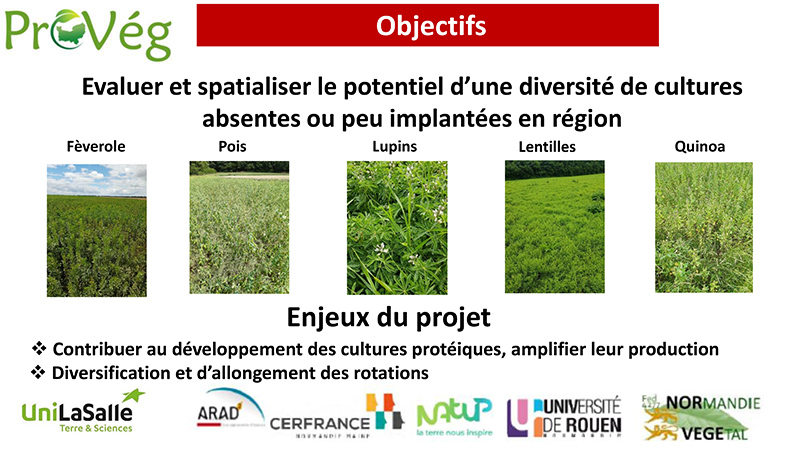
Download the PROVEG project scientific poster for more information
The partners
AGHYLE

The AGHYLE (Agroecology, Hydrogeochemistry, Environments and Resources) intersite research unit aims to contribute to the understanding of the interrelationships between agro and eco-systems management practices, soil condition and plant diversity and to identify the consequences of these interactions on the dynamics of elements and plant quality through 3 research axes
- Mechanisms of soil/plant/land organism interactions
- Element availability processes in the rock-water-soil-plant continuum
- Quantification and modeling of transfers.
Role in the PROVEG project
Unilasalle's overall strategy within the framework of the project is to evaluate :
- the role of the initial state of the soil, including the biological state, in the successful establishment of high protein value crops (pea, faba bean, lentil, lupin and quinoa) ;
- the impact of the introduction of these crops on the biological state of the soil through a global biodiversity approach and an approach targeted on the dynamics of the pathogen Aphanomyces euteiches, a major obstacle to securing yields for some of these crops (peas, lentils).
UniLaSalle, as lead partner, is in charge of the animation and coordination of the program from an administrative point of view for the management of partnership and conventional issues, as well as the technical and scientific coordination for the project management.
UniLaSalle will bring together 2 bodies during the project :
- a technical committee composed of the partners to review the progress of the actions (several times a year) and
- a steering committee made up of the leaders of the project's actions and members external to the project who have an outside view of the project (once a year).
CERFRANCE Normandie Maine et ARAD²
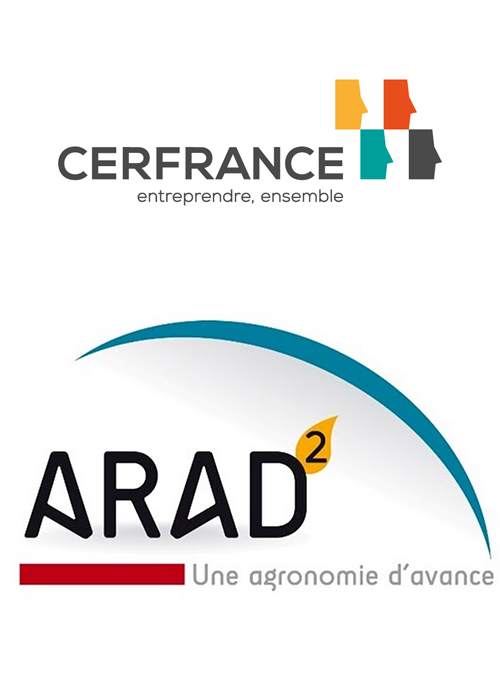
Cerfrance is the leading player in the field of accounting advice and expertise. Cerfrance Normandie Maine, born from a desire to pool the Cerfrance of Normandy and Mayenne Sarthe and aims to help the Cerfrance to develop their activities, increase their performance and the quality of their services. It runs two workshops: the Agronomic Research and Sustainable Development Workshop (ARAD²) and the Economic Studies, References, Monitoring and Forecasting Workshop (AEE).
ARAD² is dedicated to research and adaptation of technical innovations to meet the agricultural challenges of today and tomorrow: search for autonomy from external inputs, carbon storage, climate change.
Role in the PROVEG project
Cerfrance, as a referent actor of the advice to the farmers, is involved in the coordination of the research and the identification of the farmers' plots to be able to evaluate in real conditions, the impact of the introduction of the concerned crops in the rotations (Action 1, Task 2).
In addition, Cerfrance is in charge of the socio-economic study related to the introduction of 5 crops in the rotations in a Norman context.
Normandie University - GLYCOMEV Unit EA 4358
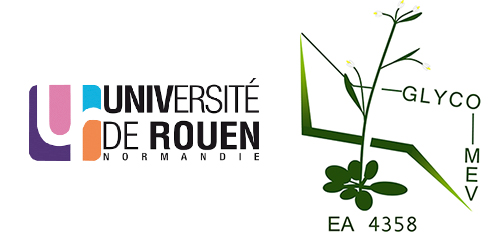
Glycobiology and Plant Extracellular Matrix Laboratory
The GlycoMev Laboratory studies plant immunity and more particularly those of field crops, focusing on root defense and soil-plant interactions.
Role in the PROVEG project
The work is organized in 2 main axes (Action 1, Task 3):
- characterization of the extracellular root trap, a key element of root defense, of 4 plants: faba bean, lupin, lentil and quinoa ;
- analysis of the root defense mechanisms set up at the first stages of infection by A. euteiches (oomycete pathogen responsible for the development of root rot in legumes). Two plants are targeted in this work: pea (highly susceptible host species) and faba bean (tolerant host species).
NATUP Agricultural Cooperative

Organized around an agricultural division that accompanies producers and four upstream divisions for the development, processing and distribution of raw or processed products, food or not, the NatUp agricultural and food cooperative group is committed to innovation in order to develop sustainable agriculture and cultivates, with its 1550 employees and 5000 members, good production and better living.
Role in the PROVEG project
NATUP is the main actor in the region in the support of producers and the development of value chains related to the crops studied in this project. NATUP is in charge of setting up and monitoring several trials including the crops of interest for this project. Indeed, microplot trials including replicates of each of the crops are underway. This work (Action 1, Task 1) is related to the identification of the desirable soil condition for the establishment of these crops.
In addition, NATUP is involved in experiments aiming at studying the susceptibility of different pea and lentil varieties to A euteiches for varietal validation adapted to the Normandy context (Action 1, Task 3).